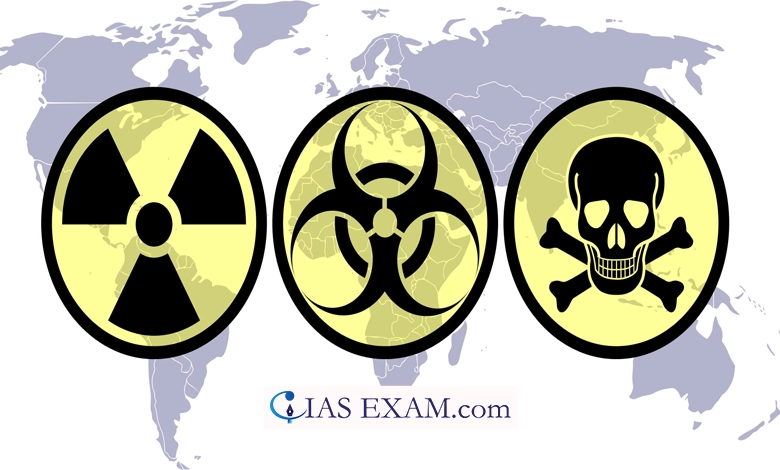Daily Current Affairs for UPSC
Nuclear, Chemical and Biological Disarmament and Non-proliferation
Syllabus- Internal Security [GS Paper-3]

Context
India and South Korea recently held a discussion on developments in the areas of disarmament and non-proliferation relating to nuclear, chemical and biological domains.
Key Highlights
- Disarmament refers to the act of removing or abolishing weapons (particularly offensive hands) both unilaterally or reciprocally.
- It might also refer both to reducing the wide variety of hands, or to putting off entire categories of weapons.
Nuclear Powers in the World
- There are nine countries diagnosed as owning nuclear weapons.
- These countries are regularly referred to as “nuclear-armed states” or “nuclear powers.”
- United States, Russia, China, United Kingdom, France, India, Pakistan, North Korea and Israel.
Treaties Related to Nuclear Disarmament
- Treaty at the Non-Proliferation of Nuclear Weapons (NPT): Signed in 1968 and entered into force in 1970, the NPT aims to stop the spread of nuclear weapons and promote disarmament.
- It divides the world into nuclear-weapon states (NWS), diagnosed as owning nuclear weapons at the time of the treaty’s signing, and non-nuclear-weapon states (NNWS), which agree now not to increase or accumulate nuclear weapons.
- The treaty additionally requires NWS to pursue disarmament negotiations in good faith.
- Treaty at the Prohibition of Nuclear Weapons (TPNW): Adopted via the United Nations in 2017 and opened for signature in 2018, the TPNW targets to restrict the development, checking out, manufacturing, stockpiling, stationing, switch, use, and risk of use of nuclear weapons.
- It represents a giant step in the direction of nuclear disarmament, although it has not been signed via nuclear-armed states.
- Comprehensive Nuclear-Test-Ban Treaty (CTBT): Opened for signature in 1996, the CTBT ambitions to prohibit all nuclear explosions for both civilian and military functions.
- While the treaty has been signed by 185 nations and ratified by means of 170, it has now not entered into force as nuclear-armed states need to ratify it to end up operational.
- Outer Space Treaty: This multilateral agreement entered into force in 1967 and bans the siting of weapons of mass destruction in place.
- All 9 states believed to have nuclear weapons are parties to this treaty.
Treaties Related to Chemical Disarmament
- Chemical Weapons Convention (CWC): It is a multilateral treaty that bans chemical weapons and calls for their destruction within a specifictime period.
- CWC is carried out by the Organization for the Prohibition of Chemical Weapons (OPCW).
- CWC currently has 193 states-parties. Israel has signed but has but to ratify the convention. Three states have neither signed nor ratified the convention (Egypt, North Korea and South Sudan).
Treaties Related to Biological Disarmament
- Biological Weapons Convention, 1972: The Biological Weapons Convention (BWC) successfully prohibits the improvement, manufacturing, acquisition, switch, stockpiling and use of organic and toxin weapons.
- It was the primary multilateral disarmament treaty banning a whole class of weapons of mass destruction (WMD).
Arguments in Favour of Disarmament
- Humanitarian Concerns: The weapons possess unheard of damaging power, capable of causing gigantic lack of existence, great devastation, and long-term environmental risk.
- Global Security: The proliferation of those weapons increases the probability in their use, whether or not deliberately or by chance, leading to catastrophic effects for humanity.
- Economic Benefits: Funds may be redirected from weapons towards more constructive functions to enhance general well-being.
- Ethical and Moral Imperatives: Eliminating nuclear weapons is regarded as an ethical imperative and a step towards constructing a more peaceful and just world.
- Environment Pollution: The weapon checking out and capacity use may have devastating environmental outcomes.
Arguments Against Disarmament
- Deterrence: Possessing these weapons serves as a powerful deterrent in opposition to potential adversaries, preventing conflicts and retaining strategic stability.
- National Security: It gives a shape of coverage towards potential threats and complements the capability to shield the pastimes and sovereignty of a country in an uncertain international environment.
- Verification and Compliance: Critics argue that without robust verification mechanisms and powerful enforcement measures, nations may take advantage of disarmament agreements for strategic benefit.
- Geopolitical Realities: Deep-rooted distrust, unresolved conflicts, and strategic opposition among states make it difficult to ascertain a situation in which all countries might willingly and concurrently relinquish their weapons.
Way Ahead
- Disarmament is visible as a crucial step towards decreasing the risks and promoting international peace and balance.
- While reaching the whole Disarmament can be a long-term goal, incremental progress can nonetheless be made via concerted worldwide efforts and cooperation.
- It calls for sustained commitment from all nations to work in the direction of a world freed from nuclear weapons, ensuring the security and well-being of future generations.
Source: The Indian Express





.png)



